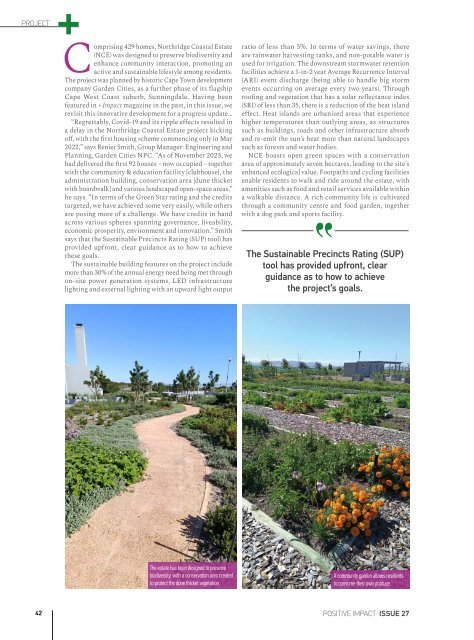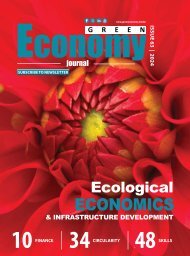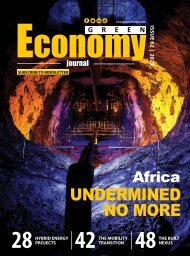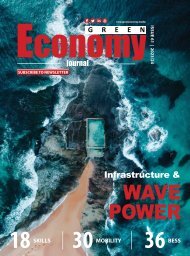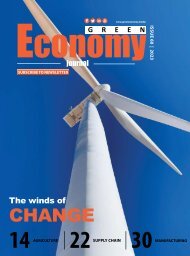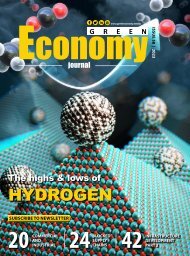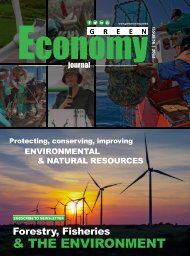+IMPACT MAGAZINE ISSUE 27
Create successful ePaper yourself
Turn your PDF publications into a flip-book with our unique Google optimized e-Paper software.
PROJECT<br />
PROJECT<br />
Comprising 429 homes, Northridge Coastal Estate<br />
(NCE) was designed to preserve biodiversity and<br />
enhance community interaction, promoting an<br />
active and sustainable lifestyle among residents.<br />
The project was planned by historic Cape Town development<br />
company Garden Cities, as a further phase of its flagship<br />
Cape West Coast suburb, Sunningdale. Having been<br />
featured in + Impact magazine in the past, in this issue, we<br />
revisit this innovative development for a progress update…<br />
“Regrettably, Covid-19 and its ripple effects resulted in<br />
a delay in the Northridge Coastal Estate project kicking<br />
off, with the first housing scheme commencing only in May<br />
2022,” says Renier Smith, Group Manager: Engineering and<br />
Planning, Garden Cities NPC. “As of November 2023, we<br />
had delivered the first 92 houses – now occupied – together<br />
with the community & education facility [clubhouse], the<br />
administration building, conservation area [dune thicket<br />
with boardwalk] and various landscaped open-space areas,”<br />
he says. “In terms of the Green Star rating and the credits<br />
targeted, we have achieved some very easily, while others<br />
are posing more of a challenge. We have credits in hand<br />
across various spheres spanning governance, liveability,<br />
economic prosperity, environment and innovation.” Smith<br />
says that the Sustainable Precincts Rating (SUP) tool) has<br />
provided upfront, clear guidance as to how to achieve<br />
these goals.<br />
The sustainable building features on the project include<br />
more than 30% of the annual energy need being met through<br />
on-site power generation systems, LED infrastructure<br />
lighting and external lighting with an upward light output<br />
ratio of less than 5%. In terms of water savings, there<br />
are rainwater harvesting tanks, and non-potable water is<br />
used for irrigation. The downstream stormwater retention<br />
facilities achieve a 1-in-2 year Average Recurrence Interval<br />
(ARI) event discharge (being able to handle big storm<br />
events occurring on average every two years). Through<br />
roofing and vegetation that has a solar reflectance index<br />
(SRI) of less than 35, there is a reduction of the heat island<br />
effect. Heat islands are urbanised areas that experience<br />
higher temperatures than outlying areas, as structures<br />
such as buildings, roads and other infrastructure absorb<br />
and re-emit the sun’s heat more than natural landscapes<br />
such as forests and water bodies.<br />
NCE boasts open green spaces with a conservation<br />
area of approximately seven hectares, leading to the site’s<br />
enhanced ecological value. Footpaths and cycling facilities<br />
enable residents to walk and ride around the estate, with<br />
amenities such as food and retail services available within<br />
a walkable distance. A rich community life is cultivated<br />
through a community centre and food garden, together<br />
with a dog park and sports facility.<br />
The Sustainable Precincts Rating (SUP)<br />
tool has provided upfront, clear<br />
guidance as to how to achieve<br />
the project’s goals.<br />
Northridge Coastal Estate became<br />
Africa’s first 4-Star Green Star<br />
sustainable precinct in 2019.<br />
A DEDICATED EFFORT<br />
“The challenges on the Green Star process were limited,<br />
with perhaps only the Climate Adaption Plan (CAP)<br />
posing some difficulty, owing to the fact that a CAP<br />
was something new in the context and size of what was<br />
encapsulated in the NCE precinct,” Smith says. “Some of<br />
the risks had to be revisited, assessed and included into<br />
the design responses, which will be submitted as part of<br />
the recertification process.”<br />
Footpaths and cycling facilities<br />
enable residents to walk<br />
and ride around the estate.<br />
A rich community life is cultivated through<br />
a community centre and food garden.<br />
The estate’s clubhouse<br />
provides a community<br />
and educational facility.<br />
The estate has been designed to preserve<br />
biodiversity, with a conservation area created<br />
to protect the dune thicket vegetation.<br />
A community garden allows residents<br />
to consume their own produce.<br />
Smith says some other minor challenges were overcome<br />
in the following areas:<br />
• Recycling: Privatising the recycling of 429 units<br />
was problematic from a financial and sustainability<br />
perspective, but through successful engagement with<br />
the City of Cape Town, NCE was included within the<br />
municipality’s recycling scheme.<br />
• Water sources: While alternative water resources<br />
were targeted as part of the project’s sustainability<br />
approach, with very saline groundwater resources and<br />
limited access to treated effluent supply resources<br />
(and not wanting to place an added burden on potable<br />
water supply), Garden Cities undertook bulk-treated<br />
effluent supply projects to unlock treated effluent<br />
water supply sources with the support of the City of<br />
Cape Town, to ensure and facilitate sustainable supply<br />
to this end.<br />
• Environmental management: This part of the process<br />
included educating and training sub-contractors and<br />
the complete supply chain, in order to align and utilise<br />
the newly created Environmental Management Plan.<br />
• Safe Places credit: This credit is a new target, where<br />
Garden Cities has incorporated “designing out crime<br />
principles”, which includes various security solutions,<br />
interventions, technologies and an all-encompassing<br />
app to manage and engage with residents.<br />
“The process of achieving and maintaining a Green<br />
Star Sustainable Precinct is administratively intense, and<br />
requires a great deal of effort and patience on the side of<br />
Residents are encouraged to get to<br />
know their neighbours and spend<br />
time living together in community.<br />
Through roofing and vegetation that has a<br />
solar reflectance index (SRI) of less than 35,<br />
there is a reduction in the heat island effect.<br />
42 POSITIVE IMPACT <strong>ISSUE</strong> <strong>27</strong><br />
POSITIVE IMPACT <strong>ISSUE</strong> <strong>27</strong><br />
43


